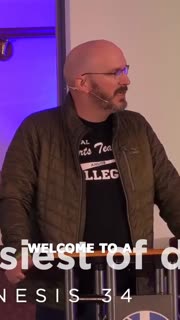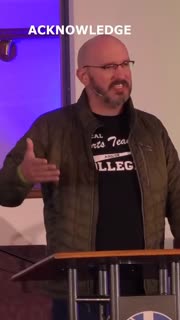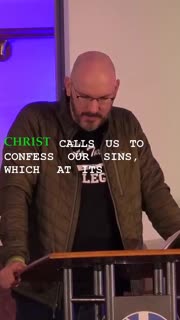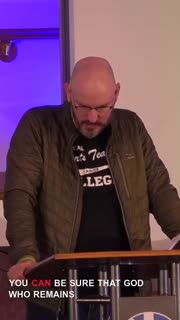Embracing the Mess: Finding Grace in Our Lives
Devotional
Sermon Summary
Bible Study Guide
Sermon Clips
1. "Welcome to a place filled with people who are a mess. If you came expecting something else, you're going to be disappointed. But by God's grace, we are a people who share that mess together." [43:23] (15 seconds)
2. "It would be a tragedy for us to read this story and not respond with identity as our own lives are a mess. And so I pray that as we look at the text together, which is Genesis 34, that we'll see the mess for what it is and be able to find the hope in it." [47:07] (23 seconds)
3. "Let's just acknowledge the mess. Let's just look through, and take a moment and see this text for all that it is. The temptation, in many cases, if you're reading through the Bible, is to hit this chapter and go, ah, it's just skipped to 35. Or if you're preaching through this, maybe this isn't such an important part of the storyline, maybe we'll move on. But we believe this is the Word of God." [53:17] (25 seconds)
4. "God wants you to see, the humanity in this text. God has a plan for your mess. And your mess is not too far or too hard or too messy or too complicated for him to deal with. It doesn't scare God away. He's not surprised. And so let's just look at this for a picture of humanity. God wants you to see humanity and he wants you to see the grace that he's giving these people and be drawn into it." [01:06:26] (36 seconds)
5. "When you're in your mess, like Jacob was, it's your opportunity to show to the world that God is sovereign through that mess. If we saw this as Jacob's example, how would we walk away thinking about God? What if it was you in this story? We as a people need to be a people who are constantly realizing and revealing our mess, revealing our sin." [01:07:30] (30 seconds)
6. "Christ calls us to confess our sins, which at its simplest is to agree with God that they are, in fact, sins against Him. When you come to Christ, don't feel like you have to get your life together first. Your life's a mess, sooner you admit that, the happier you'll be, because you'll realize that the greatest cleaner is the Lord Jesus Christ." [01:20:59] (29 seconds)
7. "You aren't likely going to see your messy life cleaned up in the near future. I don't want to bring you that hope. I don't want to tell you that if you just trust in Christ that your family relationships will get better. They probably will to some extent. But you're still going to see a messy world. I've been a Christian for 30 years and I've not seen the world get that much more cleaned up." [01:33:22] (25 seconds)
8. "You can be sure that God who remains faithful to Jacob and his mess will be faithful to you and yours." [01:34:04] (8 seconds)
Ask a question about this sermon
2. "It would be a tragedy for us to read this story and not respond with identity as our own lives are a mess. And so I pray that as we look at the text together, which is Genesis 34, that we'll see the mess for what it is and be able to find the hope in it." [47:07] (23 seconds)
3. "Let's just acknowledge the mess. Let's just look through, and take a moment and see this text for all that it is. The temptation, in many cases, if you're reading through the Bible, is to hit this chapter and go, ah, it's just skipped to 35. Or if you're preaching through this, maybe this isn't such an important part of the storyline, maybe we'll move on. But we believe this is the Word of God." [53:17] (25 seconds)
4. "God wants you to see, the humanity in this text. God has a plan for your mess. And your mess is not too far or too hard or too messy or too complicated for him to deal with. It doesn't scare God away. He's not surprised. And so let's just look at this for a picture of humanity. God wants you to see humanity and he wants you to see the grace that he's giving these people and be drawn into it." [01:06:26] (36 seconds)
5. "When you're in your mess, like Jacob was, it's your opportunity to show to the world that God is sovereign through that mess. If we saw this as Jacob's example, how would we walk away thinking about God? What if it was you in this story? We as a people need to be a people who are constantly realizing and revealing our mess, revealing our sin." [01:07:30] (30 seconds)
6. "Christ calls us to confess our sins, which at its simplest is to agree with God that they are, in fact, sins against Him. When you come to Christ, don't feel like you have to get your life together first. Your life's a mess, sooner you admit that, the happier you'll be, because you'll realize that the greatest cleaner is the Lord Jesus Christ." [01:20:59] (29 seconds)
7. "You aren't likely going to see your messy life cleaned up in the near future. I don't want to bring you that hope. I don't want to tell you that if you just trust in Christ that your family relationships will get better. They probably will to some extent. But you're still going to see a messy world. I've been a Christian for 30 years and I've not seen the world get that much more cleaned up." [01:33:22] (25 seconds)
8. "You can be sure that God who remains faithful to Jacob and his mess will be faithful to you and yours." [01:34:04] (8 seconds)








